Unit 5: Friendship
Key Unit Competence: To use language learnt in the context ofFriendship.
Introductory activity: Observe this picture and tell therelationship between these persons.
You will develop these skills
• Use formal and informal language.• State the vocabulary of politeness: describing people, safe sex.
Quick checkDo you enjoy being with your friends?
Human beings are social creatures. This means that we like to be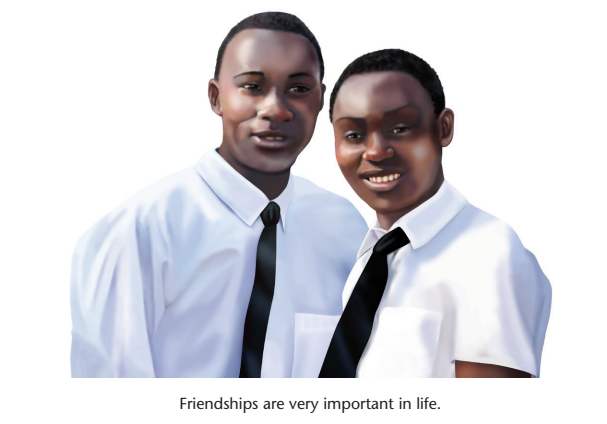
in groups and to relate to each other. Our relationships are
important to us. We have many different kinds of relationships,
for example those between family, friends and people whom we
work or study with. Friendships are among the most important
relationships in our lives. Many of our favourite memories include
times we have spent with friends. Research has recently shown
that having friends increases our chances of being happy andhealthy.
What do we mean by friendship?
Of all the things that wisdom provides to help one live one’s entire life
in happiness, the greatest by far is the possession of friendship.(Epicurus 306 B.C.)
Friendship is a relationship between two people who care about
each other and who are not related. Some friendships last a
lifetime, but it is possible that friendship can exist between twopeople at one stage of life and not at another.
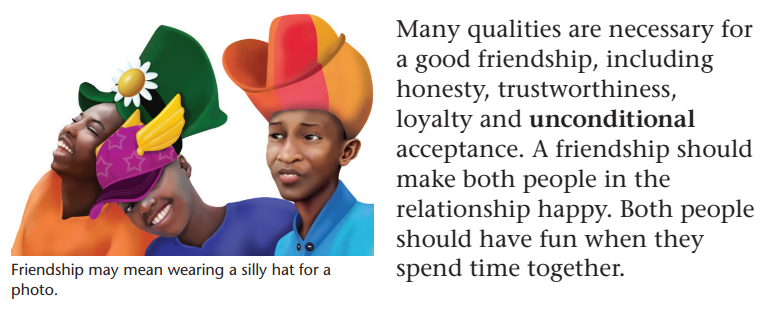
Read about being a good friend
unconditional something that does not have conditions under which it will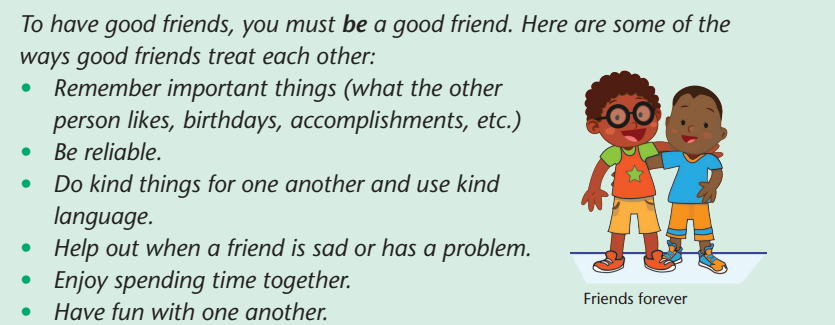
change
Activity 1: Describe being a good friend
1. Do you agree or disagree with the statement: ‘To have good friends, you
must be a good friend’?
2. Think of ways that good friends treat each other. Write your answers in yourexercise book.
Grammar focus
Writing descriptions of people
When we write descriptions of people or protrait, we need to make them so
vivid that the person reading our description can picture the person clearly in
their mind. We need to use descriptive words. For example, here are somedescriptive words for face shape:
When someone is being described to us, we want to be given certain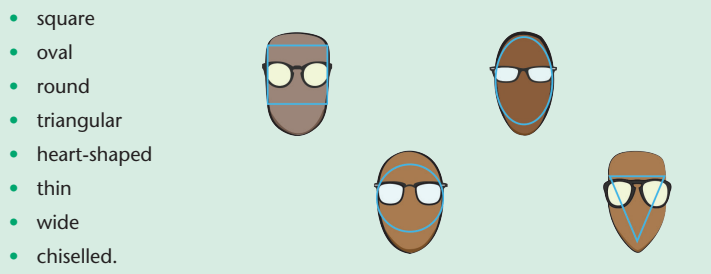
information such as their age, their sex, their height and what colour their eyesare. This helps us to picture the other person in our minds.
Activity 2: Describe a face

Activity 3: Describe someone using a photo
You will need to bring a photo of yourself in to school before doing this activity.
In your groups, look at photos of each other. Take turns in describing each other
from the photos. Try to describe as many aspects, such as age, height andappearance, as you can.
Read a description of a friend
My best friend Anitha
I want to tell you about my best friend Anitha. I am so lucky to have her
as a friend. Without her, I would not be as happy as I am now. We have
the same hobbies and sometimes share the same opinions. We are really
close to each other; she can tell if I'm lying, even if I am keeping a straightface! I don't know how she does it.
I have known Anitha for my whole life. We live next door to each other, so
I see her often. She is small and slim, with an oval face with dark brown
eyes and a big mouth. She has long, black, wavy hair, which she usuallywears in a ponytail. She is quite beautiful, especially when she smiles.
Anitha is like a part of my family. I trust her as much as I trust my family
members. She is very honest and she always says what she thinks. This
can be very useful. For example, when we go shopping, she always tells
me truthfully what suits me and what does not. Anitha always seems to
be in a good mood. She always brings out the best in me by beingpositive and cheerful.
I don't know how it is possible, but I am never bored with her. We have
never argued, but sometimes she can be stubborn. She never admits herfaults.
I hope our friendship will last and never end.
Activity 4: Use words to describe appearance
1. Write down all the words used to describe Anitha’s appearance.2. Write down as many similar words as you can.
Activity 5: Describe your friends
1. In pairs, take turns to talk to each other about a friend. Think about what
you want to say before you start speaking, and then speak for about a
minute.
2. While the other person is describing their friend, make notes about whatthey have said.
Activity 6: Write about another person
Write a description of a friend. You can use about 200–250 words.
Grammar focus
Recounting events and activities
When we recount an activity, we are telling another person about an activity or
event that has happened. It is important to structure the story in a way that
makes sense, while using language that matches the same purpose. Consider
the following before you start:
• Are the events in the correct time order?
• Is your recount in the past tense?
• Is it in the first or third person?
• Does it use time connectives such as next, meanwhile, within hours, soonafterwards, weeks later?
Example:
Last Thursday, Aimable and I played a game of football. After we had finished
playing, I went with him to his house for a snack. Soon after we had finishedeating our snacks, we decided to go and see a movie.
Activity 7: Recount an activity at school
Write a paragraph recounting something that has happened at school in thepast week.
Listen and recount
Listen while your teacher recounts the following story.
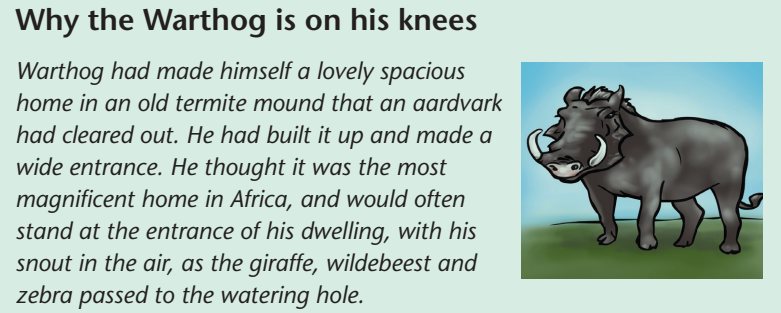
“Hah,” he thought to himself. “No one else has such a fine home!”
One day, as he looked out from the entrance of his cave, he was horrified
to see a huge lion stealthily stalking towards him. He started to back
away, but because he had made the entrance to his place so grand, thelion would have no difficulty in following Warthog right in.
“Ahhhh,” panicked Warthog. “Bhubesi will eat me in my own lounge!What will I do?”
Warthog decided to use an old trick he’d heard Jackal bragging about.
Warthog pretended to be supporting the roof of his hole with his strongback, pushing it up with his tusks.
“Help!” he cried to the lion. “I am going to be crushed! The roof is cavingin! Flee, oh mighty Bhubesi, before you are crushed along with me!”
Now Lion was no fool. He recognised Jackal’s old ploy straight away and
he wasn’t going to be caught out again. He roared so fiercely thatWarthog dropped to his knees, trembling.
Warthog begged for mercy. Luckily for him, Lion was not too hungry, and
so he pardoned the warthog and left, saying: “Stay on your knees, youfoolish beast.”
Lion laughed to himself and shook his shaggy head as we walked away.Imagine, slow-witted Warthog trying to copy Jackal’s trick!

Activity 8: Recount a story to another person
Recount the story of Warthog and Lion to each other then check to see if yougot the events in the right order.
Grammar focus
Reported speech
We use reported speech when we want to repeat what someone has previously
said. There is a difference between direct speech and reported speech: in direct
speech, the talking is actually happening, and in reported speech, we are telling
someone else about what was said.
Example:
• Dinah said, “I am tired.” (direct speech)
The following are some of the important verb changes we use when makingreported speech.
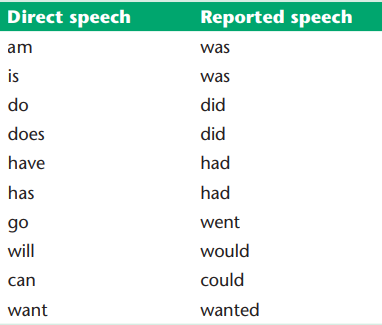
Activity 9: Change from direct to reported speech
Change the following sentences form direct speech to reported speech.
1. John said, “I can ride a horse.”
2. John said, “My mother does the cleaning.”
3. “I’m going to the cinema,” he said.
4. “My name is Lela,” she said.5. She said, “What shall we learn today?”
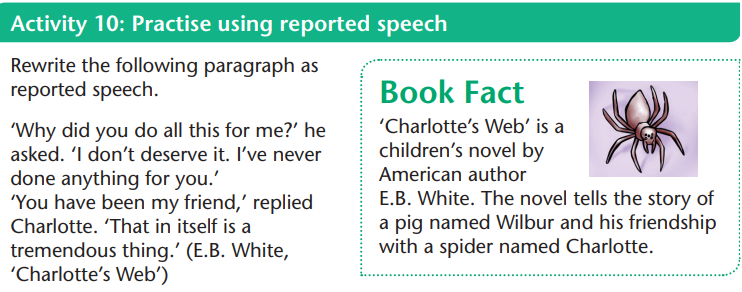
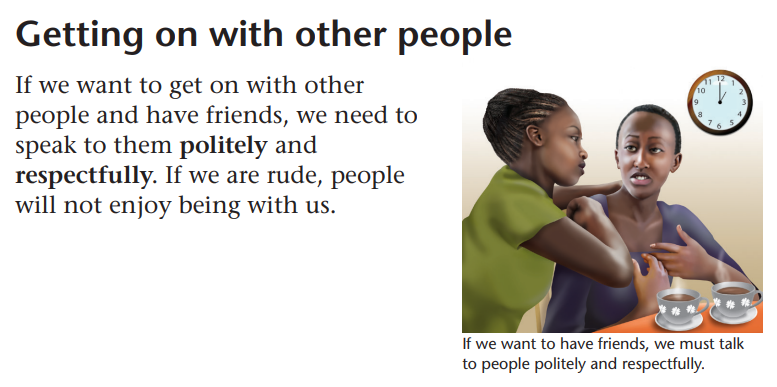
Grammar focus
Making offers and requests
When we are making polite offers and requests, we make use of the verbs
would, could, may, will and can. To ask questions in a very polite way, we use‘would you’ or ‘could you please’ plus the simple tense of the verb.
Don’t use ‘may’ in polite question when ‘you’ is the subject.
This is incorrect: May you please close the window?
‘May’ goes best with ‘I’ and ‘we’ in polite questions.This is correct: May I help you with the washing?
The word ‘please’ makes the request more polite and less direct. For example:
• Please would you return the book you borrowed last week.
We can express an offer using ‘would’, ‘could’ and ‘may’. For example:
• Would you like a cup of tea?
• May I serve you some fruit?
• Could I give you one of my beautiful suits?• Would I serve hot milk and bread for dinner?
Activity 11: Role play being polite
In your groups, make up a role play about a situation where you use polite offersand requests, for example dinner with your family.
Grammar focus
Direct speech
When we use direct speech, we are reporting something that was said exactly as
it was spoken. We use quotation marks to enclose the words that were spoken.For example: June said, “It is going to rain today.”
We can use direct speech to report things as they are said (the present tense) oras they were said some time ago (the past tense).
Examples:
• He says, “I am happy.” (present tense)• He said, “I am happy.” (past tense)
Activity 12: Practise direct speech
Change the examples of polite offers into direct speech:
1. Would you like a cup of tea?
2. May I serve you some fruit?
3. Could I give you one of my beautiful suits?4. Would I serve hot milk and bread for dinner?
Grammar focus
Formal and informal ways of asking and offering
‘Could’ and ‘would’ are used to make requests in a formal way. They softenrequests and make them more polite.
Examples:
• Would/could you please serve me a cup of tea? (But not: Serve me a cup of
tea, please.)
• Would/could you please repeat what you said? (But not: Repeat what you
said, please.)• Do/would you mind closing that window?
When talking to friends, we may want to be less formal. Using ‘can’ and ‘will’ isless formal, but still polite.
Examples:
• Can I borrow your ruler, please?• Will you stop shouting, please?
Activity 13: Make informal requests
Change the following sentences into informal requests:
1. Would you please pass me a cup of tea?
2. Could you help me with my homework?
3. Would you tidy the house for me?
4. Would you like me to pass you a banana?5. Would you like to come to the cinema with me?
Activity 14: Plan an outing
1. In your group, plan an outing to somewhere nice.
2. Write down your plan.
3. Now pretend that you have been on the outing and write a report telling
your friends what happened.
4. Read over your report and notice any grammar changes that happenedwhen you wrote about it.
Activity 15: Read a dialogue
In pairs, read the following dialogue.
Peter: Would you mind if I served you a glass of juice, Rhonah?
Rhonah: No, I wouldn’t mind. I am rather grateful. Could I help you
with the cooking, Peter?
Peter: Yes, please. Thank you very much. Would you like another set
of clothes to work in?
Rhonah: Well, thank you. I could still work in these. By the way, do you
mind if I clean the kitchen?
Peter: Before you do that, may I give you another glass of juice or will
that one do?
Rhonah: This will do. Would you like to play tennis with me later?Peter: Wonderful! I would like that.
Talking about boyfriends and girlfriends
Read about romantic relationships
Loving and being loved adds richness to our lives. When
people feel close to others they are happier and even healthier. Love helpsus feel important, understood and secure.
• Attraction is the ‘chemistry’ part of love. It’s all about the physical –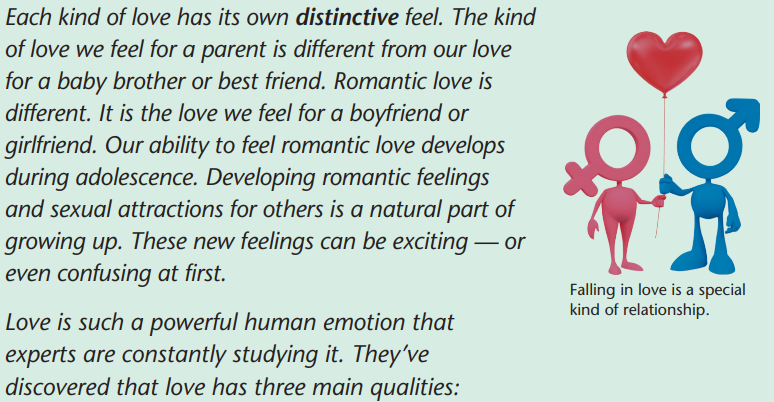
even sexual – interest that two people have in each other. Attraction is
responsible for the desire we feel to kiss and hold the object of our
affection. Attraction is also responsible for the flushed, nervous-but excited
way we feel when that person is near.
• Closeness is the bond that develops when we share thoughts and
feelings that we don’t share with anyone else. When you have this
feeling of closeness with your boyfriend or girlfriend, you feel
supported, cared for, understood and accepted for who you are. Trust
is a big part of this.
• Commitment is the promise or decision to stick by the other personthrough the ups and downs of the relationship.
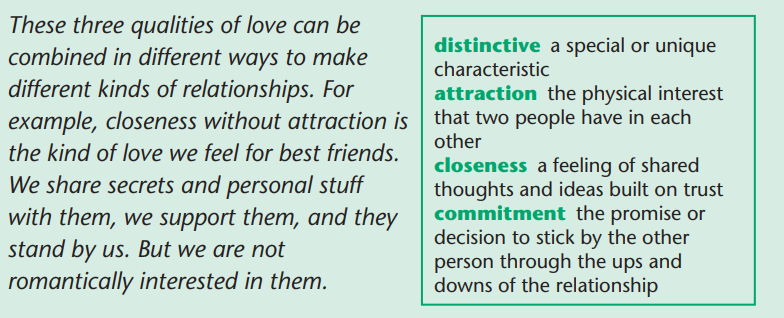
Activity 16: Comprehension
1. List some of the ways that love can make us feel.
2. Define romantic love.
3. Analyse the ‘chemistry’ of love.4. Discuss the meaning of commitment and how it applies to romantic love.
Activity 17: Talk about relationships
In your group, discuss what is good or not good in relationships between the sexes.
Read about being ready for sex
Young people can feel a lot of pressure to have sex. Friends may tell you
they’re all doing it (sometimes even if they’re not). You see it on the TV
and in the movies. You might also feel pressured by a particular person.
Or you might feel that it’s expected of you from a girlfriend or boyfriend.
When we love someone, we respect them and we do not try to makethem do something they feel uncomfortable about.
Sex is never an obligation – each partner has the right to say no. If yourpartner asks you to stop, you must respect this.
It’s important to know about the physical and emotional dangers of early
sex and it’s also important to be able to identify the benefits of saving sexfor when you are really ready
What is safer sex?
Safer sex means sexual contact that does not involve any blood, semen
or vaginal fluids being passed between partners. We say ‘safer sex’rather than ‘safe sex’ because sex can’t be guaranteed 100% safe.
The best way to have safe sex is to be in a relationship where neither of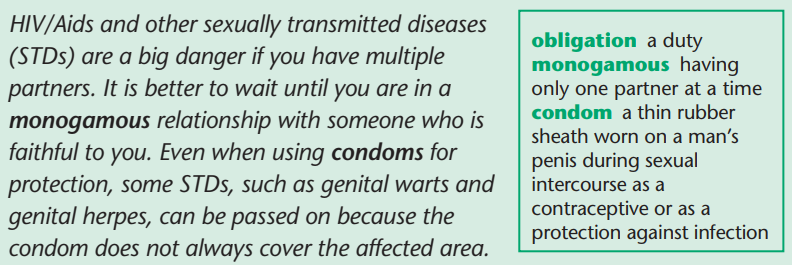
you has sex outside the relationship, and where you are both free of any
STDs. You should also use contraception if you are not ready to have a
child. Some people say the only form of safe sex is to abstain totally (nothave sex at all), but most people would see this as being unrealistic.
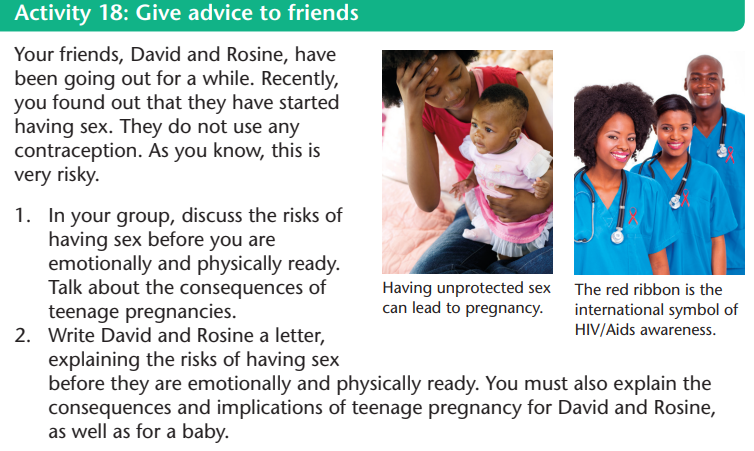
Writing and understanding
Activity 19: Write about romantic relationships
Write a short text (250–300 words) about relationships between the sexes.
Talking about HIV and Aids
In Rwanda, it is estimated that 3.1% of adults in the 15–49 age
group are HIV-positive. HIV stands for Human Immunodeficiency
Virus and is an illness that alters the immune system, making
people vulnerable to illnesses and infections. HIV leads to Aids
(Acquired Immune Deficiency Syndrome). People can live with the
virus in their bodies for many years before they develop Aids, butAids cannot be cured and eventually leads to death.
The virus is passed from one person to another through contact
with the blood or body fluids of an infected person. The main
ways in which people contract HIV are:
• having unprotected sex with an infected person
• multiple sexual partners; polygamy can spread the disease
• babies drinking the breast milk of an infected person
• infected blood transfusions
• infection from mother to foetus during pregnancy• drug users sharing dirty needles.
Activity 20: Share your HIV/Aids knowledge
1. Discuss the ways that HIV can be contracted.
2. Talk about how to have a romantic relationship and avoid contracting HIV.
3. Discuss the impact of HIV/Aids on society. How does it affect the family, thecommunity and the economy of Rwanda?
Vocabulary, spelling and pronunciation
Activity 21: Match words and their meanings
Look up the words in the left-hand column and then match to the correct
meaning in the right-hand column. Make sure that you can pronounce thewords correctly
Text: Read the following passage and answer the questions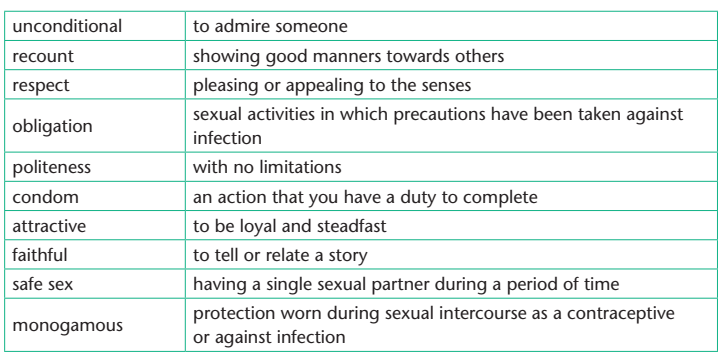
bellow
The nurse-patient relationship
Working as a nurse can be an exceptionally rewarding career
path. However, that’s not to say it doesn’t have its downsides. In
fact, nurses are both physically and emotionally pushed on a daily
basis, which can be hard on an individual working in this field. For
these healthcare workers, it is vital that they know how to establish
healthy relationships with the patients they interact with day
in and day out. Not only is it good for the patient, but it can also
benefit the mental health of the nurse as well. For nurses, finding a
balance between compassionate care and professionalism is keyin order to connect with the individuals they are treating.
A therapeutic nurse-patient relationship is defined as a helping
relationship. This means that it is based on mutual trust and
respect, the nurturing of faith and hope. It is also about being
sensitive to self and others, and assisting with the gratification
of your patient’s physical, emotional, and spiritual needs throughyour knowledge and skill.
The nurse-patient relationship enables nurses to spend more time,
to connect, to interact with their patients as well as to understand
their patient’s needs. It assists nurses to establish a unique perspective
regarding the meaning of the patient’s illness as well asbeliefs, and preferences of patients and their families.
Comprehension questions
1. What do you understand by the following words and expressions in the
context of the above text:
a. a rewarding career path
b. downsides
c. day in and day out
d. compassionate care
e. mutual trust
f. a unique perspective2. How does good relationship with patients benefit the nurse?
Vocabulary
Construct your own sentences using each of the following words
a) rewarding career path
b) downsides
c) vital
d) day in and day out
e) compassionate care
f) therapeutic
g) mutual trust
h) nurturingi) gratification
Application activity
Write a composition describing a day in the life of a nurse.
Assessment
1. Change the following sentences into reported speech. They have been
started for you.
a) “Don’t waste your money,” she said.
She told the boys________________________ .
b) “What have you decided to do?” she asked him.
She asked him __________________________ .
c) “I always wake up early,” he said.
He said __________________________________ .
d) “You should revise your lessons,” he said.
He advised the students ____________________ .
e) “Where have you been?” he asked me.
He wanted to know __________________________ . (5 marks)
2. Change the following sentences into direct speech.
a) Carene said that she might come.
b) Jean-Paul said that he could fail.
c) Olive said that David should stay in bed.
d) Thierry said that he used to have a car.
e) Josiane said that she wished they were in South Africa. (5 marks)
3. Fill in the blanks in the sentences below to make them
into formal requests.
a) _________ I speak to Mr Mugabo, please?
b) ___________ you open the window, please? It’s hot in here.
c) Would you mind if I _________ come to your party?
d) Would you mind if I _________ your dictionary for an
hour or so?
e) Could I stay here for a while? Yes, you __________ . (5 marks)
4. Write a short report explaining the dangers of teenage sex. (5 marks)Total (20)
